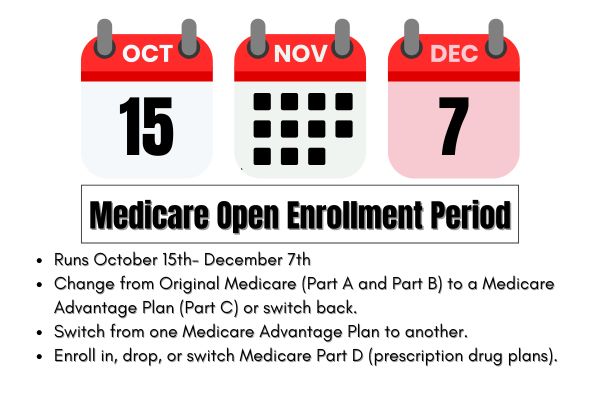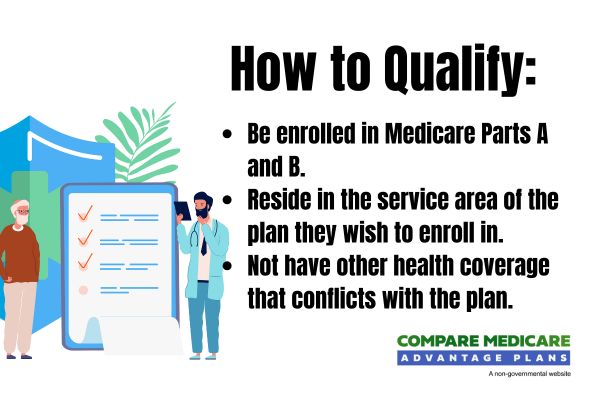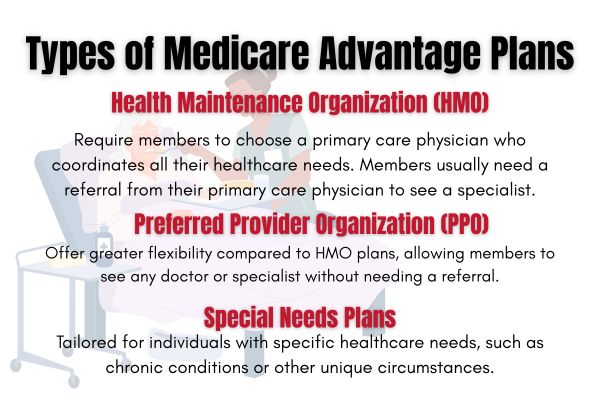Medicare Advantage Plans Michigan 2026
Looking into Medicare Advantage Plans Michigan
Key Takeaways
- Medicare Advantage Plans in Michigan provide comprehensive coverage, including medical, dental, and vision benefits, and are administered by private insurance companies under CMS regulation.
- There are various types of Medicare Advantage Plans available in Michigan, including HMO, PPO, and Special Needs Plans, each offering distinct features and benefits to cater to different healthcare needs.
- Enrollment in Medicare Advantage Plans is confined to specific periods, such as the Annual Open Enrollment Period from October 15 to December 7, and plans often have no deductibles or low premiums, enhancing accessibility for beneficiaries.
Compare Plans in One Step!
Enter Zip Code
Understanding Michigan Medicare Advantage Plans 2026

Medicare Advantage Plans in Michigan provide comprehensive coverage, including all the services covered by Original Medicare except for hospice care. These plans are administered by private insurance companies and regulated by the Centers for Medicare and Medicaid Services (CMS), ensuring that they meet specific standards and provide reliable coverage.
One of the key advantages of Medicare Advantage Plans is the additional benefits they offer. Unlike Original Medicare, these plans often include dental, vision, and hearing coverage, which can significantly enhance the quality of care for beneficiaries. However, costs and coverage can vary widely between different plans, so beneficiaries should carefully evaluate their options.
Enrollment in Medicare Advantage Plans is limited to specific periods, such as the Annual Open Enrollment Period from October 15 to December 7. During this time, beneficiaries can switch plans or enroll in a new one, ensuring they have the coverage that best meets their needs.
Types of Michigan Medicare Advantage Plans Available
Michigan offers a variety of Medicare Advantage Plans, providing residents with options that include medical, dental, and prescription drug coverage. These plans cater to diverse healthcare needs, ensuring that beneficiaries can find a plan that suits their specific requirements. The primary types of plans available are Health Maintenance Organization (HMO), Preferred Provider Organization (PPO), and Special Needs Plans (SNPs).
Each type of new plan has its own set of features and benefits, designed to meet different healthcare needs and preferences. Next, we’ll explore the specifics of HMO, PPO, and SNP plans to help you make an informed choice.
HMO Plans
HMO plans in Michigan require members to choose a primary care physician who coordinates all their healthcare needs. This means that to see a specialist, members usually need a referral from their primary care physician. This system helps streamline care management and ensures that all aspects of a member’s health are monitored closely.
These plans often emphasize preventive care and may have lower monthly premiums compared to other Medicare Advantage options. Many HMO plans include additional benefits like dental, vision, and prescription drug coverage, making them an attractive option for beneficiaries looking for comprehensive care.
HMO plans typically restrict members to a network of doctors and hospitals for non-emergency care. This means that if you seek care outside of this network, you may have to pay the full cost of the services. Ensure that your preferred healthcare providers are within the plan’s network before enrolling.
PPO Plans
PPO plans offer greater flexibility compared to HMO plans, allowing members to see any doctor or specialist without needing a referral. This can be particularly beneficial for those who want the freedom to choose their healthcare providers. Blue Cross Blue Shield of Michigan, for example, offers Medicare Advantage PPO plans that have no residency restrictions within the U.S., providing even more flexibility for members.
Preventive care services are provided at no out-of-pocket cost under these plans, and copays for office visits generally remain consistent, with a $10 fee for both primary care and specialist visits. This predictability can make managing healthcare expenses easier for beneficiaries.
PPO plans often come with higher costs for out-of-network services. While you have the freedom to choose providers outside of the plan’s network, it’s important to be aware that doing so may result in higher out-of-pocket expenses.
Special Needs Plans (SNPs)
Special Needs Plans (SNPs) are tailored for individuals with specific healthcare needs, such as chronic conditions or other unique circumstances. These plans provide personalized care and benefits designed to meet the specific needs of their members, ensuring that they receive the focused care they require.
Michigan will start the transition to a Highly Integrated Dual Eligible Special Needs Plan (HIDE SNP) on January 1,
Contracts for the new HIDE SNP program have been awarded to nine plans for a duration of seven years, with possibilities for three additional one-year extensions. Beneficiary feedback has been actively sought through listening sessions to inform the transition, ensuring that the new program meets the needs of its members.
Overview of Michigan Medicare Advantage Plans 2026
Medicare Advantage Plans in Michigan provide comprehensive coverage that includes medical, dental, and prescription drug benefits. Many of these plans feature no monthly premiums and offer all-in-one coverage, making healthcare accessible and affordable for beneficiaries. This comprehensive approach ensures that members have access to a wide range of services without the need for multiple plans.
The network of providers for Medicare Advantage Plans in Michigan includes over 80,000 local doctors and more than 1.7 million nationwide. This extensive network ensures that beneficiaries have access to quality care wherever they are. Certain plans also include benefits like coverage for preventive care, vision, and hearing services, enhancing the overall value.
Financial protection is another key feature of Medicare Advantage Plans in Michigan, as they typically cap out-of-pocket expenses. This means that beneficiaries have a limit on how much they will have to pay out of pocket for covered services each year, providing peace of mind and financial security.
Covered Services and Benefits

Most Medicare Advantage plans in Michigan have no deductible for services, making it easier for members to access the care they need without worrying about upfront costs. Preventive care is generally provided at no cost to members, encouraging regular check-ups and early detection of potential health issues. Emergency room visits typically incur a $65 copay unless the patient is admitted, which can help manage unexpected healthcare expenses.
Inpatient hospital services are usually covered at 100% for unlimited days, provided they occur in a participating hospital, ensuring that members receive the necessary care without financial strain. Mental health treatments include coverage for both inpatient and outpatient services, with certain copays applicable, making mental health care more accessible.
Hearing aids are also covered, with one device every 36 months, subject to cost limits, providing essential support for hearing-impaired members. Members can receive home health care services and durable medical equipment under specific conditions, ensuring that they have access to necessary care and devices at home.
Vision care typically includes one comprehensive eye exam per year, with limits on dilation and eyeglasses, supporting overall eye health.
Key Benefits of Michigan Medicare Advantage Plans 2026
Michigan Medicare Advantage plans provide significant cost savings compared to traditional supplemental plans, with some retirees saving approximately $5 million in premiums for 2024. These plans are designed to offer lower out-of-pocket expenses and more comprehensive benefits than publicly available plans, ensuring that members receive high-quality care at an affordable cost.
Enrollment in U-M Medicare Advantage plans does not require members to pay any deductibles for covered services, making healthcare more accessible and predictable. Members benefit from a structured out-of-pocket maximum of $3,000, ensuring predictable costs for healthcare services and protecting against high medical expenses.
The U-M plans also promote engagement in health management through educational programs and preventive care reminders, which enhance overall member health and well-being. These initiatives encourage members to take an active role in their health, leading to better health outcomes and a higher quality of life.
Additional Health Services
The MI Coordinated Health program integrates Medicare and Medicaid services for dual-eligible individuals, launching in select areas of Michigan
Medicare Advantage plans in Michigan may include comprehensive dental coverage, encompassing various procedures like crowns and extractions, ensuring that members have access to essential dental care. Additionally, plans often provide vision and hearing services, enhancing overall healthcare accessibility and supporting members’ sensory health.
Many Medicare Advantage plans offer wellness programs, including free access to fitness facilities through partnerships like SilverSneakers, promoting physical activity and overall well-being. Some plans also provide allowances for over-the-counter items and healthy foods, encouraging better health management and supporting members in making healthier lifestyle choices.
Enrollment Process for Michigan Medicare Advantage Plans 2026
Current enrollees in Medicare Advantage plans can switch to another plan until March 31, providing flexibility for members to find the best fit for their needs. Eligible individuals can enroll in Medicare Advantage plans during their Initial Enrollment Period (IEP), which spans three months before, the month of, and three months after they turn 65. This initial period is crucial for new beneficiaries to secure their healthcare coverage.
Knowing the various enrollment periods is key to making informed decisions. The following subsections will detail when to enroll and the different enrollment periods.
When to Enroll
Enrollment opportunities may vary based on a beneficiary’s specific situation, such as turning 65 or losing other coverage. If not enrolled during the Initial Enrollment Period (IEP), individuals may sign up during the General Enrollment Period from January 1 to March 31. This period allows those who missed their IEP to still gain coverage.

The Medicare Open Enrollment Period occurs annually from October 15 to December 7, allowing beneficiaries to make changes to their health plans. During this time, participants can switch from Original Medicare to a Medicare Advantage plan or vice versa. Changes made during the Medicare Open Enrollment take effect starting January 1 of the following year.
In the Medicare Advantage Open Enrollment Period, which runs from January 1 to March 31, participants can switch between Medicare Advantage plans or revert to Original Medicare. This period provides an additional opportunity for those already enrolled in a Medicare Advantage plan to make adjustments.
Different Enrollment Periods
There are several enrollment periods, including Initial Enrollment, Annual Election Period (AEP), and Open Enrollment Period (OEP). Special Enrollment Periods are available for those who experience qualifying life events, allowing them to enroll outside standard periods.
Medicare Advantage plans have specific enrollment periods, including the Initial Enrollment Period for new beneficiaries, the Annual Enrollment Period (AEP) typically from October 15 to December 7 each year, and Special Enrollment Periods (SEPs) triggered by qualifying life events. During the Annual Enrollment Period, beneficiaries can switch between Medicare Advantage plans or return to Original Medicare with or without a standalone prescription drug plan.
Special Enrollment Periods allow for changes to Medicare Advantage plans under certain circumstances, such as moving out of the plan’s service area or losing other health coverage. These periods ensure that beneficiaries can maintain appropriate coverage throughout the year.
OEP, AEP, Special Enrollment
The AEP allows beneficiaries to change their Medicare Advantage plans annually from October 15 to December 7. This period is crucial for making adjustments to coverage for the upcoming year.
The Open Enrollment Period (OEP) for Medicare runs from January 1 to March 31 each year, allowing beneficiaries to switch plans or return to Original Medicare. This period provides an additional opportunity for those already enrolled in a Medicare Advantage plan to make changes.
Special Enrollment Periods (SEPs) allow beneficiaries to enroll or make changes to their Medicare plans outside of OEP and AEP due to qualifying life events, such as moving or losing other coverage. These periods ensure that beneficiaries can maintain appropriate coverage throughout the year, regardless of changes in their circumstances.
Costs Associated with Michigan Medicare Advantage Plans 2026

In Michigan, the typical monthly premium for Medicare Advantage plans is approximately $21.23 for the year 2024. However, many plans offer premiums as low as $0, significantly reducing the financial burden on beneficiaries. These low-cost options make it easier for individuals to access the healthcare coverage they need without worrying about high monthly premiums.
Knowing the costs associated with Medicare Advantage Plans is crucial. Next, we’ll detail premiums, co-pays, and out-of-pocket maximums to help you make an informed decision.
Premiums and Co-Pays
Some Medicare Advantage plans in Michigan offer $0 premium options, allowing beneficiaries to choose plans without upfront monthly costs. This can be particularly beneficial for those on a fixed income. Most Medicare Advantage plans utilize fixed copayments for services, making costs predictable for members.
For example, starting January 1, 2025, office visit co-pays for members of U-M Medicare Advantage plans will be lowered to $10 for visits to primary care physicians and specialists. Emergency room visits under the Medicare Advantage plans incur a co-pay of $65, but this fee is waived if the patient is admitted.
Both the Michigan Care Advantage plan and U-M Premier Care Advantage plans have a maximum annual out-of-pocket cost set at $3,000 per individual. Preventive care services are provided without any out-of-pocket costs to members of Michigan Medicare Advantage plans. All examined Medicare Advantage plans feature a zero deductible for all covered services.
Out-of-Pocket Maximums
Out-of-pocket maximums for Medicare Advantage plans in Michigan can vary significantly, providing cost protection for members against high healthcare expenses. Unlike Original Medicare, Medicare Advantage plans have an out-of-pocket maximum, which caps the total amount members pay for covered services in a year. This feature provides financial security and peace of mind for beneficiaries.
In Michigan, Medicare Advantage plans have an annual out-of-pocket maximum set at $3,000 per individual for each calendar year. This limit prevents unexpected high medical costs, making healthcare expenses easier to manage.
Covered Services and Benefits
Medicare Advantage plans in Michigan often include comprehensive coverage for medical, dental, and prescription drugs. Many plans provide preventive care services, such as annual wellness visits and screenings, at no additional cost. Dental coverage in these plans may encompass services like crowns, fillings, and extractions.
Enrollees can expect additional benefits such as vision and hearing coverage in many Medicare Advantage offerings. Some plans include access to wellness programs, including fitness memberships through programs like SilverSneakers. Certain Medicare Advantage plans may offer allowances for over-the-counter items and healthy food purchases, promoting better health management and supporting members in making healthier lifestyle choices.
How to Qualify for Michigan Medicare Advantage Plans 2026
Before: Eligibility for Michigan Medicare Advantage Plans generally requires individuals to be enrolled in Medicare Parts A and B. To qualify for a Medicare Advantage Plan, individuals must reside in the service area of the plan they wish to enroll in. Most Medicare Advantage Plans require beneficiaries to not have other health coverage that conflicts with the plan.

After: Eligibility for Michigan Medicare Advantage Plans generally requires individuals to meet the following criteria:
- Be enrolled in Medicare Parts A and B.
- Reside in the service area of the plan they wish to enroll in.
- Not have other health coverage that conflicts with the plan.
Additionally, individuals must not have end-stage renal disease (ESRD) at the time of enrollment to qualify for most Medicare Advantage Plans. Some Medicare Advantage Plans may have specific health qualifications or underwriting standards that applicants must meet. Enrollment in Medicare Advantage Plans typically requires individuals to fill out an application and may involve additional verification of eligibility.
Contracted Network and Access to Care
HMO plans typically require members to use a specific network of healthcare providers to receive benefits, except in emergency situations. PPO plans provide more flexibility by allowing members to receive care from outside their network, albeit at a higher cost. Some HMO plans may not require referrals for accessing specialty care, streamlining the process for members.
Health Maintenance Organizations (HMOs) often focus on providing coordinated care through a limited network of local physicians and hospitals. Medicare Advantage plans are required to establish a network of providers that sufficiently meets the healthcare needs of their enrollees. The network must reflect the typical care patterns prevalent in the region it serves.
Certain types of Medicare Advantage plans, such as regional preferred provider organizations (RPPOs), may offer care outside of their network under specific conditions. Plans like private fee-for-service (PFFS) must operate in areas where multiple network plans are available to ensure competitive access to care.
Comparing Michigan Medicare Advantage Plans to Original Medicare
Medicare Advantage plans must cover at least the same services as Original Medicare but often provide additional benefits such as dental, vision, and hearing care. These plans are required to provide at least the same benefits as Original Medicare, but many offer additional coverage options that enhance the overall value.
Knowing the differences between Medicare Advantage Plans and Original Medicare is crucial. Next, we’ll explore coverage differences and cost comparisons to help you choose the best option.
Coverage Differences
Original Medicare has limited coverage for dental, vision, and hearing services, while Medicare Advantage plans typically include these services. Medicare Advantage plans often include prescription drug coverage, which is not a standard feature of Original Medicare. This extra coverage can make Medicare Advantage plans more comprehensive and beneficial.
Original Medicare does not cover long-term care, but many Medicare Advantage plans do, including vision and dental care. Medicare Advantage plans typically have a defined network of doctors and hospitals, unlike Original Medicare, which allows you to see any provider who accepts Medicare. This network requirement can streamline care but may also limit provider choice.
Medicare Advantage plans can vary greatly in coverage options and costs, unlike the standard benefits of Original Medicare. This variability lets beneficiaries choose a plan that fits their needs and preferences, offering tailored healthcare solutions.
Cost Comparisons
Unlike Original Medicare, which has no out-of-pocket maximum, Medicare Advantage plans set a limit on out-of-pocket expenses for covered services. This cap offers financial protection and peace of mind, preventing unlimited medical expenses in a given year.
Original Medicare generally requires a 20% coinsurance for services, whereas many Medicare Advantage plans offer fixed copays for similar services. This predictability can make it easier for beneficiaries to manage their healthcare expenses. Emergency care coverage when traveling abroad is typically limited in Original Medicare, while many Medicare Advantage plans offer coverage for emergencies outside the U.S.
Service costs under Original Medicare can be harder to estimate due to percentage-based coinsurance, while Medicare Advantage plans offer predictable copays. This predictability makes it easier for beneficiaries to budget for their healthcare needs and avoid unexpected expenses.
Emergencies and Referrals

In a medical emergency, individuals should always seek care at the closest emergency room, as Medicare Advantage plans are mandated to cover emergency services at in-network rates. This ensures that members receive the necessary care without worrying about network restrictions. Medicare Advantage plans must cover emergency room services anywhere in the United States, providing peace of mind for beneficiaries.
No referral is needed to access emergency care through a Medicare Advantage Plan, simplifying the process for members in urgent situations. If receiving emergency care outside of the network, members will be billed either $50 or their plan’s in-network cost, whichever is lower. Medically necessary follow-up care related to an emergency must be covered by your Medicare Advantage Plan to avoid health risks.
Federal law ensures your right to receive emergency medical care, regardless of your insurance status or ability to pay. While Medicare Advantage plans may offer a broader range of services, they often necessitate referrals for specialist visits, which can add complexity to accessing care.
Summary
Michigan Medicare Advantage Plans
Enrollment periods and the costs associated with these plans are crucial factors to consider. With options for $0 premiums, fixed copayments, and capped out-of-pocket expenses, Medicare Advantage Plans provide financial protection and predictability. The extensive network of providers and additional health services enhance the overall value of these plans, making them an attractive option for Michigan residents.
In conclusion, choosing the right Medicare Advantage Plan can significantly impact your healthcare experience and financial well-being. By understanding the various options, benefits, and costs, you can make an informed decision that best suits your needs. Take action today to explore your options and ensure you have the best coverage
Frequently Asked Questions
→ What are the key differences between Medicare Advantage Plans and Original Medicare?
The key differences between Medicare Advantage Plans and Original Medicare include additional benefits like dental, vision, and hearing coverage in Advantage Plans, which Original Medicare lacks. Furthermore, Advantage Plans typically have out-of-pocket maximums and may include prescription drug coverage, providing greater financial protection.
→ When can I enroll in a Medicare Advantage Plan in Michigan?
You can enroll in a Medicare Advantage Plan in Michigan during your Initial Enrollment Period (IEP) when you turn 65, the Annual Enrollment Period (AEP) from October 15 to December 7, or the Open Enrollment Period (OEP) from January 1 to March 31 if you are already enrolled. It’s important to mark these dates to ensure you don’t miss your opportunity for enrollment.
→ What types of Medicare Advantage Plans are available in Michigan?
Michigan provides several types of Medicare Advantage Plans, including Health Maintenance Organization (HMO) plans, Preferred Provider Organization (PPO) plans, and Special Needs Plans (SNPs), each designed to meet different healthcare requirements. Choose the plan that best fits your specific health needs for optimal coverage.
→ How much do Medicare Advantage Plans in Michigan typically cost?
Medicare Advantage Plans in Michigan typically cost about $21.23 per month, with many options available at $0 premiums. These plans also feature fixed copayments and an annual out-of-pocket maximum to help control healthcare costs.
→ Do Medicare Advantage Plans cover emergency services?
Medicare Advantage Plans do cover emergency services at in-network rates throughout the United States, and no referral is necessary for access. Additionally, they provide coverage for medically necessary follow-up care related to the emergency.

ZRN Health & Financial Services, LLC, a Texas limited liability company




